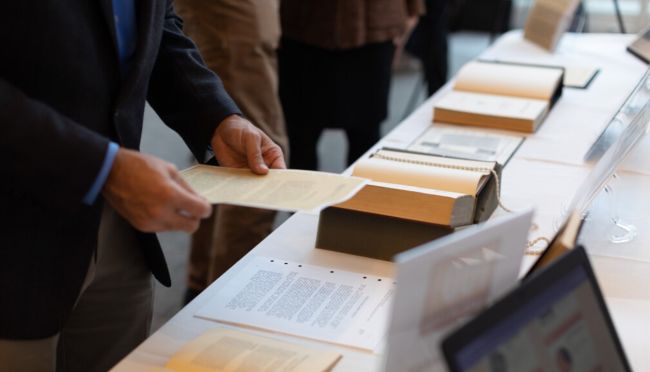Learning →
→

- 14 Jun 2023
- Research & Ideas
Four Steps to Building the Psychological Safety That High-Performing Teams Need
Struggling to spark strategic risk-taking and creative thinking? In the post-pandemic workplace, teams need psychological safety more than ever, and a new analysis by Amy Edmondson highlights the best ways to nurture it.

- 02 May 2022
- What Do You Think?
Can the Case Method Survive Another Hundred Years?
The case method pioneered by Harvard Business School has weathered a hundred years of controversy and criticism. However, is the approach the best way to teach people to lead in a world that demands more agility and adaptability? James Heskett asks. Open for comment; 0 Comments.
- 03 Aug 2016
- What Do You Think?
How Can We Hold the “Leadership Industry” Accountable?
SUMMING UP This month’s reader comments provide little hope that the leadership-development industry can achieve its goals, says James Heskett. So why does the leadership industry continue to thrive? Open for comment; 0 Comments.
- 05 May 2014
- Research & Ideas
Reflecting on Work Improves Job Performance
New research by Francesca Gino, Gary Pisano, and colleagues shows that taking time to reflect on our work improves job performance in the long run. Open for comment; 0 Comments.

- 11 Apr 2014
- Working Paper Summaries
Learning By Thinking: How Reflection Improves Performance
Knowledge plays an important role in the productivity and prosperity of economies, organizations, and individuals. Even so, research on learning has primarily focused on the role of doing (experience) in fostering progress over time. To compare the effectiveness of different sources of learning, the authors take a micro approach and study learning at the individual level. They argue that learning from direct experience can be more effective if coupled with reflection—that is, the intentional attempt to synthesize, abstract, and articulate the key lessons taught by experience. Using a mixed-method approach that combines laboratory experiments and a field study in a large business process outsourcing company in India, they find support for this prediction. Further, they find that the effect of reflection on learning is mediated by greater perceived ability to achieve a goal (i.e., self-efficacy). Together, these results reveal reflection to be a powerful mechanism behind learning, confirming the words of American philosopher, psychologist, and educational reformer John Dewey: "We do not learn from experience ... we learn from reflecting on experience." Key concepts include: Learning from direct experience can be more effective if coupled with reflection-that is, the intentional attempt to synthesize, abstract, and articulate the key lessons taught by experience. Reflecting on what has been learned makes experience more productive. Reflection builds one's confidence in the ability to achieve a goal (i.e., self-efficacy), which in turn translates into higher rates of learning. Closed for comment; 0 Comments.
- 02 May 2011
- Research & Ideas
Casino Payoff: Hands-Off Management Works Best
Micromanagers beware: Research of casino hosts by Harvard Business School's Dennis Campbell and Francisco de Asís Martinez-Jerez and Rice's Marc Epstein makes the case that hands-off management can work to improve employee learning and decision making. Closed for comment; 0 Comments.
- 24 Nov 2008
- Research & Ideas
Harvard Business School Discusses Future of the MBA
The MBA industry is in turmoil. Many business schools are revisiting their offerings to see if they still have relevance in the 21st century. And HBS is using its centennial year to convene worldwide experts on business education and plot its directions for the next 100 years. From HBS Alumni Bulletin. Key concepts include: Critics claim MBA programs put too much emphasis on theory and not enough on leadership in a global environment. A number of top MBA programs have retooled their offerings. HBS is looking at several change proposals, including the development in students of "soft skills." Whatever curriculum changes HBS ultimately adopts, the School will remain committed to the case method. Closed for comment; 0 Comments.

- 11 Dec 2006
- Working Paper Summaries
Three Perspectives on Team Learning: Outcome Improvement, Task Mastery, and Group Process
Organizations increasingly rely on teams to carry out critical strategies and operational tasks. How do teams learn, and what factors are most important to team learning? This paper reports on current perspectives and findings that address these questions, looking at empirical studies on team learning from three areas of research: outcome improvement, task mastery, and group process. Overall, Edmondson and coauthors characterize the nature of research to date and assemble what is known and unknown about the theoretically and practically important topic of team learning. Key concepts include: Team learning has value for organizations; learning in teams is seen as a key mechanism through which learning organizations become strategically and operationally adaptive and responsive. Research on team learning is at a crossroads. How the learning of individual work teams translates into organizational learning is not well understood, and management literature to date offers few insights. One avenue for future research is the durability and utility of team-based networks for the organization as a whole. Learning in teams almost necessarily plays a role in developing the knowledge and skills of individuals who compose the team. Another avenue for future research is how individuals benefit from their team learning experiences in terms of intellectual, career, and personal development goals. Organizations stand to benefit when ideas are cross-fertilized and diverse individuals learn to work together. "Outsiders" can introduce valuable ideas. Learning and execution are often at odds: Learning by its nature involves uncertainty, false starts, and occasional dead ends. Team learning in organizations must be recognized as a strategy for tolerating forays into the unknown. Closed for comment; 0 Comments.
- 26 Nov 2001
- Research & Ideas
How Toyota Turns Workers Into Problem Solvers
Toyota's reputation for sustaining high product quality is legendary. But the company's methods are not secret. So why can't other carmakers match Toyota's track record? HBS professor Steven Spear says it's all about problem solving. Closed for comment; 0 Comments.
- 18 Jun 2001
- Lessons from the Classroom
Why Leaders Need Great Books
How do leaders get to be leaders? HBS professor Joseph L. Badaracco Jr.'s remarkable course uses works of literature instead of case studies to teach leadership. Find out what’s on his reading list. HBS Working Knowledge series on leadership and great books.--> Closed for comment; 0 Comments.
- 18 Apr 2000
- Research & Ideas
Learning in Action
Most managers today understand the value of building a learning organization. But in moving from theory into practice, managers must realize there's no one-size-fits-all strategy applicable to every company and every situation. In this excerpt from his book Learning in Action: A Guide to Putting the Learning Organization to Work (HBS Press), HBS Professor David A. Garvin shows how different organizations put different learning strategies to work. Closed for comment; 0 Comments.

How Humans Outshine AI in Adapting to Change
Could artificial intelligence systems eventually perform surgeries or fly planes? First, AI will have to learn to navigate shifting conditions as well as people do. Julian De Freitas and colleagues pit humans against machines in a video game to study AI's current limits and mine insights for the real world.